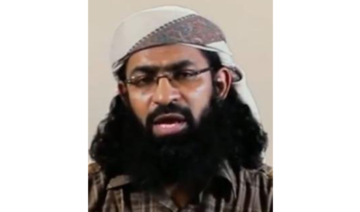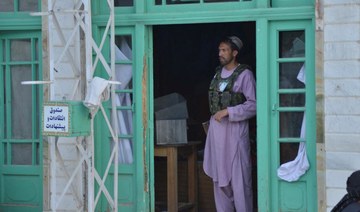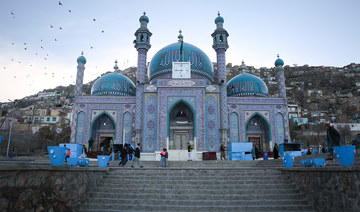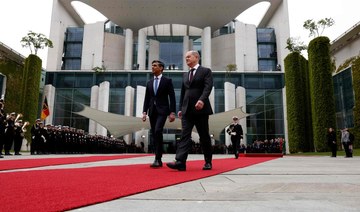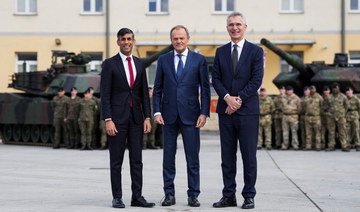JAFFNA, Sri Lanka: The ethnic Tamils of Sri Lanka tried to gain autonomy in their northern heartland first through three decades of protests and strikes, then through three decades of civil war. Northern cities were reduced to rubble and at least 80,000 people were killed by the time the government crushed the Tamil Tiger rebels in 2009.
Now, Tamils are hoping that provincial elections Saturday are the first step toward what all those years of struggle and war never brought.
The elections will create the Tamils’ first functioning provincial government and is expected to give them a limited say in their own affairs — a taste of democracy after years under rebel or military control.
“Let us have the right to look after ourselves,” said C.V. Wigneswaran, a former Supreme Court justice and chief candidate for Tamil National Alliance, the main Tamil party and once a political proxy for the Tigers.
“There is absolutely no necessity for us to separate,” from the rest of Sri Lanka, he said. He called their political goals “no violence, one country.”
The elections are seen by the United Nations and the world community as a crucial test of reconciliation between the Tamils and majority ethnic Sinhalese who control the government and the military. Campaigning has been marked by sporadic attacks and threats, mainly against Tamil Alliance supporters.
More than 700,000 voters are registered to elect 36 members to the provincial council, which will not have much power. A governor appointed by the central government will wield the most control.
“Powers are given by the right hand and taken away by the left,” Wigneswaran said. His party wants a federal system, with more power shifted to the regional government, though the central government rejects any sort of power-sharing.
Part of the goal of Saturday’s election, Wigneswaran said, is simply to help Tamil voters understand they have a role to play in politics. The Tamil Tigers, a brutal, cult-like movement, allowed no dissent from their policies, and Sri Lankan military rule has left little room for public discussion.
“We are trying to get them more and more involved in the democratic way of life,” Wigneswaran said.
Tamils have been demanding regional autonomy to the country’s north and east, where they are the majority, since Sri Lanka became independent from Britain in 1948. The campaign took the form of nonviolent protests for many years, but in 1983, civil war broke out between government forces and armed Tamil groups calling for full independence.
The provincial council was created in 1987 as an alternative to separation. But the Tigers — the strongest of the rebel groups, and eventually the de facto government across most of the north and east — rejected it as inadequate. The fighting that followed prevented the council from functioning.
The military defeat of the Tigers meant Tamils were back to where they had started 60 years earlier. They had no tangible achievements and had suffered not only tens of thousands of deaths, but the loss of nearly a million Tamils who left the country as refugees.
Though the Tamil Alliance hopes Saturday’s elections are a step on the road to greater autonomy, the government of President Mahinda Rajapaksa intends to retain its grip on power. It has criticized the alliance’s demand for federalism, insisting it really wants secession.
Rajapaksa’s Sri Lanka Freedom Party hopes to win over Tamils by rebuilding roads, schools, hospitals and other infrastructure destroyed in the war. But residents also say the army is taking over large swaths of private land to build camps and even businesses such as hotels, and bringing in Sinhalese people to change the province’s ethnic breakdown.
Angajan Ramanathan, a Freedom Party candidate, said that while power-sharing is important, development must come first.
“We have tried everything in the past 60 years,” Ramanathan said. He said it’s now time to work with the government, and to convince it that Tamils no longer want a separate state.
“We Tamils need power devolution, and we need rights,” he said. “What I feel is that we can only get this through the government.”
Voters interviewed in recent days ranged from businessmen anxious for self-rule to people who simply want more jobs.
“Today’s reality is that the people will back anyone who will solve the unemployment problem,” said M. Sweetson, a bank employee from the fishing village of Pashaiyoor.
The provincial government still faces immense challenges from the war, from widespread unemployment to a desperate housing shortage. Rebel suspects are held in jail without trials, and thousands of war widows and orphans are in need of help.
The UN welcomed the election in a statement, calling it an “important opportunity to foster political reconciliation.”
The UN has called on Sri Lanka repeatedly to more thoroughly investigate war crimes committed by both sides. A UN report has indicated Sri Lankan troops may have killed as many as 40,000 Tamil civilians in the final months of the conflict. The Tigers are also accused of killing civilians, holding them as human shields and recruiting child soldiers.
The UN estimates that 80,000 to 100,000 people died in the conflict, but the number is feared to be much higher. Few outsiders had any access to combat zones in the bloody final phase of the war.
The Tamil Alliance has said if it wins control of the provincial government, it also will push for an international war crimes investigation.
War-scarred Sri Lankan Tamils see hope in election
War-scarred Sri Lankan Tamils see hope in election
Resurgent terror groups in Afghanistan will strike West, warns resistance leader

- Exiled head of National Resistance Front says Al-Qaeda, Daesh presence growing in country
- Taliban emboldened by Western commitment to Ukraine, focus on Middle East
London: Terrorist groups in Afghanistan are regrouping in the wake of the Western evacuation from the country and will strike on US and European soil, the leader of an anti-Taliban movement has warned.
The exiled leader of Afghanistan’s National Resistance Front, Ahmad Massoud, said a terror attack in the US or Europe is “not about a matter of if, it’s a matter of when,” The Independent reported.
Massoud said circumstances in the country and the wider region resemble the pre-9/11 landscape, with terror training camps opening across Afghanistan.
Ali Maisam Naziry, the NRF’s head of foreign relations, said of the resurgent groups: “The attacks in Russia, Iran and Brussels, and the neutralised attack in Germany, are examples of how fast they are moving to threaten global security.”
He added that since the Taliban’s return to power in 2021, Afghanistan has witnessed a “massive influx” of foreign terrorist fighters who belong to the more than 20 militant networks operating in the country, including Al-Qaeda, Daesh-Khorasan and the Haqqani Network.
Massoud warned that the West’s commitment to Ukraine and Israel is serving as a distraction, emboldening the Taliban in the process.
Afghanistan is “no longer a priority” for the Biden administration in the US, he told The Independent last year.
Nathan Sales, a former US ambassador-at-large and coordinator for counterterrorism, said last year: “The continued partnership between the Taliban and Al-Qaeda is perhaps best seen in the fact that after the US withdrawal, Al-Qaeda leader Ayman Al-Zawahiri resurfaced in Afghanistan, living in a safe house associated with the Haqqani Network, a Taliban faction that maintains close ties to Al-Qaeda and is itself a US-designated Foreign Terrorist Organization.
“The key takeaway is that the Taliban felt emboldened to welcome Al-Qaeda’s leader back to Kabul, and Al-Qaeda’s leader felt it was safe enough there to accept the offer.”
Sudanese man detained in UK for deportation to Rwanda: NGO

- Asylum seeker attended routine sign-in at immigration center in London on Monday
- Home Office: First flight to African country ‘set to take off in 10-12 weeks’
LONDON: A Sudanese asylum seeker in the UK has been told of his imminent deportation to Rwanda after attending a routine Home Office appointment, The Guardian reported.
SOAS Detainee Support, an NGO, told the newspaper that the case is believed to be the first under the Rwanda scheme, which has received royal assent.
The UK government policy aims to deport rejected asylum seekers to the African country through a bilateral agreement.
The Sudanese man said he had arrived on Monday to sign in at the Lunar House immigration reporting center in Croydon, south London, but was told he would be deported to Rwanda, and was subsequently detained.
He is one of three people being held after attending the facility, including an Afghan national, SDS said.
The NGO, which offers advice and support to detained asylum seekers, said it had received an “alarmingly high number of calls” since the government’s announcement of Rwanda flights.
A Home Office spokesperson said in a statement: “Now that the Safety of Rwanda Act has passed and our treaty with Rwanda ratified, government is entering the final phase of operationalising this landmark policy to tackle illegal migration and stop the boats.
“This includes detaining people in preparation for the first flight, which is set to take off to Rwanda in 10-12 weeks.”
Daesh claims gun attack killing six in Afghan mosque
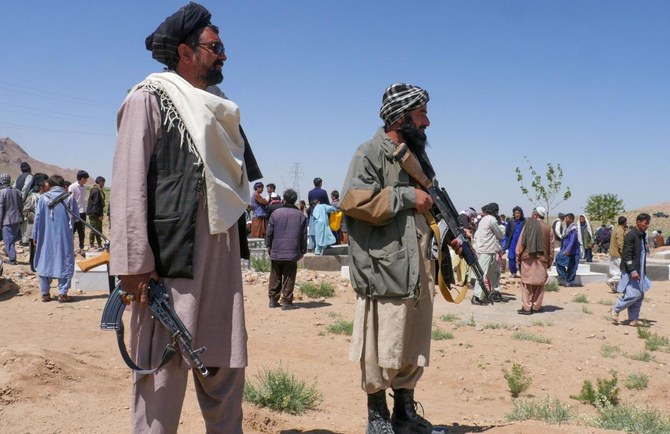
- Daesh said numerous gunmen had stormed the mosque with machine guns
HERAT: The Daesh group has claimed a gun attack on a minority Shiite mosque in western Afghanistan that killed six people on Monday.
Interior ministry spokesman Abdul Mateen Qani said Tuesday morning that “an unknown armed person shot at civilian worshippers in a mosque” in Herat province’s Guzara district at around 9:00 p.m. (1630 GMT) the previous night.
“Six civilians were martyred and one civilian was injured,” he wrote on social media platform X.
Late Tuesday, the regional chapter of Daesh group claimed responsibility and said numerous gunmen had stormed the mosque with machine guns — contradicting the official account of a single assailant.
Locals said the mosque, located just south of provincial capital Herat, served the minority Shiite community and that an imam and a three-year-old child were among those killed.
They said a team of three gunmen had staged the attack.
“One of them was outside and two of them came inside the mosque, shooting the worshippers,” said 60-year-old Ibrahim Akhlaqi, the brother of the slain imam. “It was in the middle of prayers.”
“Whoever was in the mosque has either been martyred or wounded,” added 23-year-old Sayed Murtaza Hussaini.
Taliban authorities have frequently given death tolls lower than other sources after bombings and gun attacks, or otherwise downplayed them, in an apparent attempt to minimize security threats.
Daesh in Afghanistan
The regional chapter of Daesh is the largest security threat in Afghanistan and has frequently targeted Shiite communities.
The Taliban government has pledged to protect religious and ethnic minorities since returning to power in August 2021, but rights monitors say they’ve done little to make good on that promise.
The most notorious attack linked to Daesh since the Taliban takeover was in 2022, when at least 53 people — including 46 girls and young women — were slain in the suicide bombing of an education center.
Taliban officials blamed Daesh for the attack, which happened in a Shiite neighborhood of the capital Kabul.
Afghanistan’s new rulers claim to have ousted IS from the country and are highly sensitive to suggestions the group has found safe haven there since the withdrawal of foreign forces.
A United Nations Security Council report released in January said there had been a decrease in Daesh attacks in Afghanistan because of “counter-terrorism efforts by the Taliban.”
But the report said Daesh still had “substantial” recruitment in the country and that the militant group had “the ability to project a threat into the region and beyond.”
The Daesh chapter spanning Afghanistan, Pakistan and Central Asia claimed responsibility for the March attack on the Crocus City Hall concert venue in Moscow, killing more than 140 people.
It was the deadliest attack in Russia in two decades.
UK local polls could determine PM Sunak’s fate
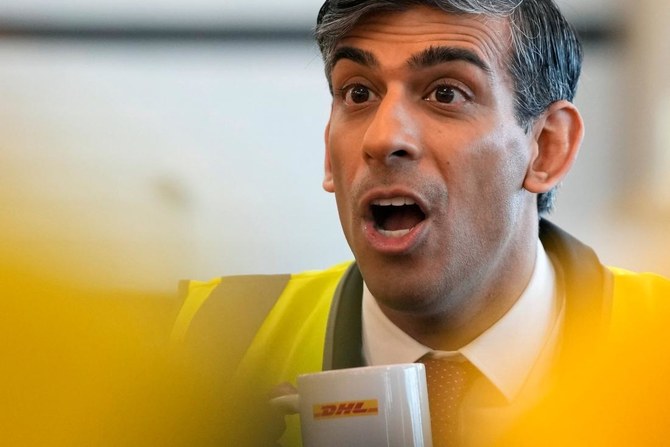
- The polls are the last major electoral test before a general election that Sunak’s party, in power since 2010, seems destined to lose to the Labour opposition
London: Britain’s ruling Conservative party is expected to suffer heavy losses in crunch local elections this week that are likely to increase pressure on beleaguered Prime Minister Rishi Sunak.
The polls are the last major electoral test before a general election that Sunak’s party, in power since 2010, seems destined to lose to the Labour opposition.
Sunak has said he wants to hold the nationwide vote in the second half of the year, but bruising defeats in Thursday’s votes could force his hand earlier.
“These elections form a vital examination for the Sunak premiership — road-testing its claim that the plan is working and the degree to which voters still lend that notion any degree of credibility,” political scientist Richard Carr told AFP.
Incumbent governments tend to suffer losses in local contests and the Conservatives are forecast by pollsters to lose about half of the council seats they are defending.
Sunak’s immediate political future is said to rest on whether two high-profile Tory regional mayors get re-elected in the West Midlands and Tees Valley areas of central and northeast England.
Wins for the Conservative mayors, Andy Street and Ben Houchen, would boost hopes among Tory MPs that Sunak can turn around their party’s fortunes in time for the general election.
But speculation is rife in the UK parliament that a bad showing could lead some restive Conservative lawmakers to try to replace Sunak before the nationwide poll.
“If Andy Street and Ben Houchen both lose, any idea that Sunak can carry on is surely done,” said Carr, a politics lecturer at Anglia Ruskin University.
“Whether that means he rolls the dice on a general election or gets toppled remains to be seen.”
Factional infighting has plagued the Tories in recent years, serving up five prime ministers since the 2016 Brexit vote, including three in four months from July to October 2022.
A group of restive Conservative MPs have drawn up a “policy blitz” for a potential successor to Sunak in the event of massive losses this week, British media have reported.
Some observers say it would be madness for the Conservatives to topple another leader when Sunak has provided some stability since succeeding Liz Truss in October 2022.
Others say the party’s credibility is already shot so why not try one last desperate throw of the dice to try to stop a predicted Labour landslide.
Some 52 MPs would need to submit letters of no confidence in Sunak to trigger an internal party vote to replace him — a tall ask.
“I still expect Sunak will lead the Conservatives into the general election,” Richard Hayton, a politics professor at Leeds University, told AFP.
“But some MPs may seek to move against him, which will further damage his standing with the general public.”
Sunak, 43, was an internal Tory appointment following Truss’s disastrous 49 days premiership in which her unfunded tax cuts caused market turmoil and sank the pound.
Despite numerous leadership resets under Sunak, the Tories have continued to trail Labour, led by Keir Starmer, by double digits in most opinion polls.
An Ipsos poll earlier this month put Sunak’s satisfaction rating at a joint all-time low of minus 59 percent.
More than 2,500 councillors are standing in England on Thursday, as well as London’s Labour mayor Sadiq Khan who is seeking a record third term in office.
Most of the council seats up for re-election were last contested in 2021, when ex-Tory premier Boris Johnson was popular as he rolled out Covid-19 vaccines.
UN Human Rights Chief troubled by ‘heavy-handed’ action against protesters at US colleges
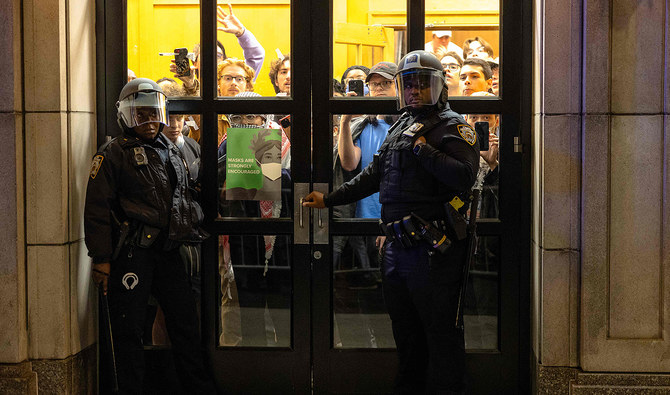
- Volker Turk says ‘freedom of expression and the right to peaceful assembly are fundamental to society, particularly when there is sharp disagreement on major issues’
- Protests have taken place on campuses in several states as students demand colleges withdraw investments from businesses involved in Israel’s assault on Gaza
NEW YORK CITY: The UN’s high commissioner for human rights on Tuesday said he is troubled by “a series of heavy-handed steps” taken by education authorities and law enforcement officials to break up protests at college campuses in the US.
Volker Turk said: “freedom of expression and the right to peaceful assembly are fundamental to society, particularly when there is sharp disagreement on major issues, as there are in relation to the conflict in the Occupied Palestinian Territory and Israel.”
Pro-Palestinian demonstrations have spread across college campuses in Texas, New York, Atlanta, Utah, Virginia, New Jersey, California and other parts of the US as students protest against the death toll during the war in Gaza, call for a ceasefire and demand authorities at their colleges withdraw investments from businesses involved in Israel’s military assault on Gaza.
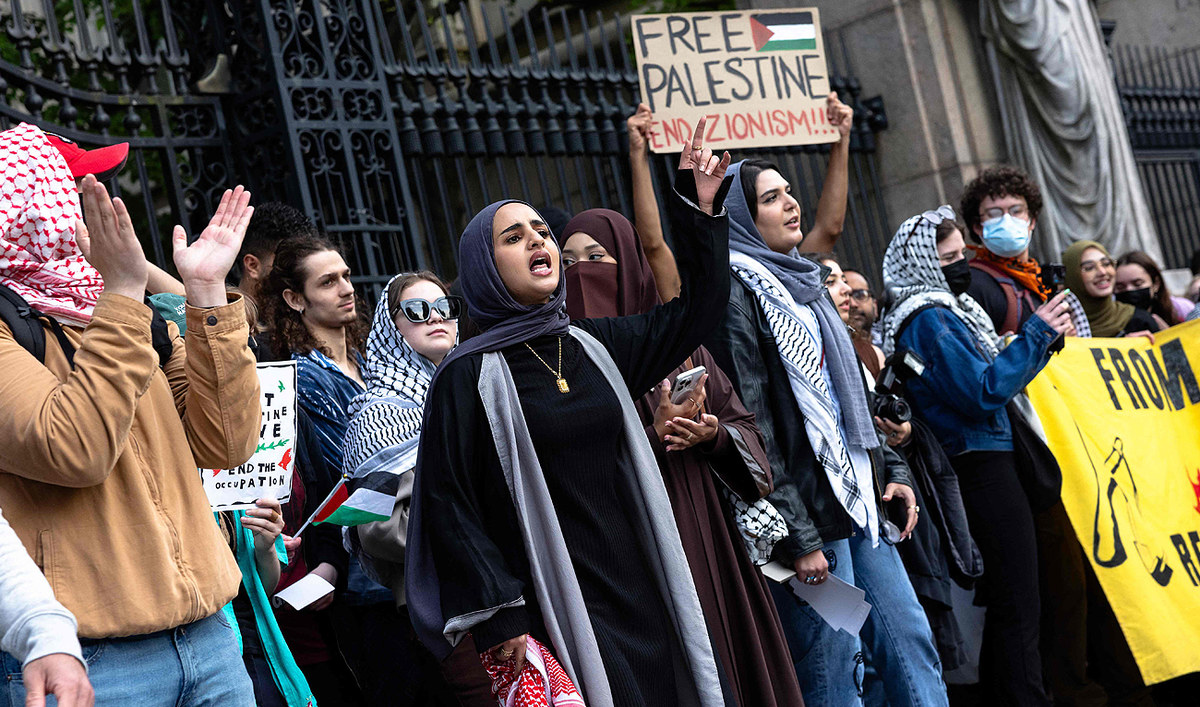
Though largely peaceful, at some locations the protests have been dispersed or dismantled by security forces. Hundreds of students and teachers have been arrested, some of whom face charges or academic sanctions.
Turk expressed concern that some of the responses by law enforcement authorities at several colleges might have been disproportionate, and called for such actions to be scrutinized to ensure they do not exceed what is necessary “to protect the rights and freedoms of others.”
He added that all such actions must be guided by human rights law, while “allowing vibrant debate and protecting safe spaces for all.”
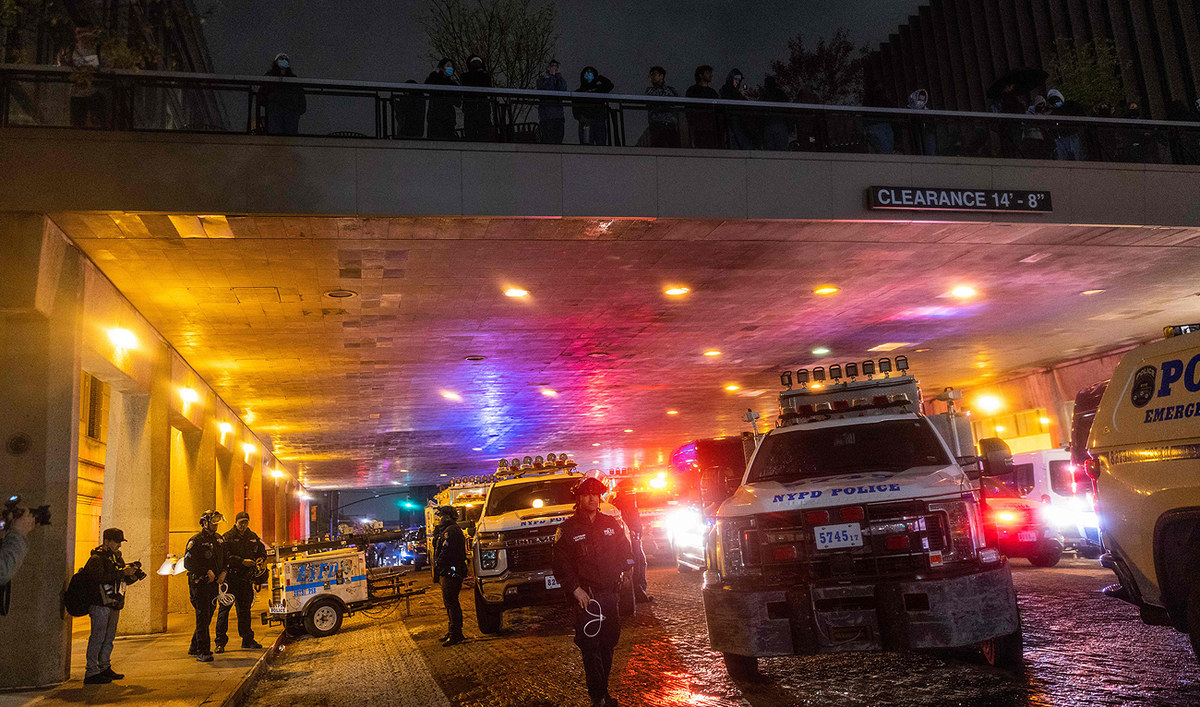
He reiterated that antisemitic, anti-Arab and anti-Palestinian activities and speech are “totally unacceptable, deeply disturbing (and) reprehensible.” However, the conduct of protesters must be assessed and addressed individually rather than through “sweeping measures that impute to all members of a protest the unacceptable viewpoints of a few,” Turk added.
“Incitement to violence or hatred on grounds of identity or viewpoints, whether real or assumed, must be strongly repudiated. We have already seen such dangerous rhetoric can quickly lead to real violence.”




